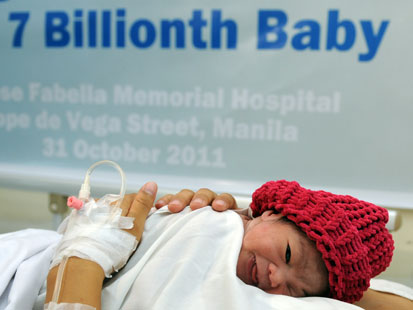Seven Billion And Counting…
As Americans dodge ghosts and goblins today for Halloween, the planet is facing a prospect some find a lot scarier than haunted houses: the birth of the 7 billionth person.
It’s been just 12 years since the population hit the 6 billion mark. To put that time period in context, just 200 million people walked the earth when Christ was born and the population didn’t hit the first billion until 1804.
The United Nations estimates that by 2050, the planet will be home to more than 9 billion. But if women have just half a child more than expected, the population could top 15 billion by 2100 (get an idea of what number you were from the BBC here).
However, women are having far fewer children than they did in the past, and the rate of growth has decreased dramatically from the 1950s, when women had an average of six children, to 2.5 today.
China’s controversial “one-child” policy alone may have prevented adding 400 million people to its population, according to demographers at Renmin University in Beijing. They estimate that the world would have reached 7 billion five years ago if not for this government mandate.
Many countries in Western Europe are already well below so called “replacement levels,” the 2.1 babies per woman it takes to keep the population stable. Ironically, shrinking populations are actually a cause for concern in many parts of Western Europe, where they’ve been talking for years about how to care for an aging population.
Can Earth Sustain 7 Billion?
It’s hard to imagine how many 7 billion is. Even the zeros of 7,000,000,000 are disorienting.
Packed together at the same density of New York City, 7 billion people would roughly fit into the state of Texas. On the surface, the planet could hold a lot more than it does today. But how many people it can actually sustain is a more difficult question.
Already, nearly one of every seven people go hungry each day. The same amount lacks access to clean water.
The environmental footprint of 7 billion people also complicates matters, as climate change affects where food can be grown and the kinds of crops that can be produced. A U.N. report released earlier this year found that Africa could lose nearly two thirds of arable land by 2025, and corn, a staple crop for much of the continent, could become impossible to grow in some places.
Baby 7 Billion
“The first question every journalist asks is, ‘Who is baby 7 billion’?” Omar Gharzeddine, a spokesman for the United Nations Population Fund (UNFPA) said.
Is it in China, the country with the world’s largest population, or India, the fastest growing, where 51 babies are born every minute? Or maybe it will be one of the couple hundred babies born in Monaco each year.
“Of course we don’t actually know that,” Gharzeddine said.
In 1999, Kofi Annan, U.N. Secretary General at the time, symbolically designated Adnan Mevic, a baby boy born in Sarajevo, as the 6 billionth person in an attempt to restore peace and tolerance in the war-torn country.
Today, the NGO Plan International named a baby girl born in Uttar Pradesh, India’s most populous state, as Baby 7 Billion to stress the importance of women in the world. UNFPA’s State of the World Population 2011 report highlights the need for investments in health and education for girls to break cycles of poverty around the world.
Nearly two billion of the people on the planet are women of reproductive age. Fertility rates vary dramatically between countries, with women averaging more than seven children in the African nation of Niger compared to less than one on the islands of Macau and Hong Kong.
UNFPA Executive Director Babatunde Osotimehin sees the world at 7 billion as a call to action, an opportunity to bring women’s rights and reproductive health into the global conversation, writing in the UNFPA report that “governments that are serious about eradicating poverty should also be serious about providing these services.”
